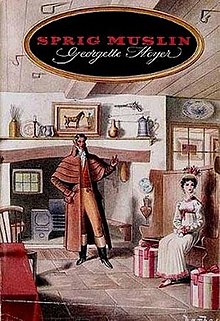Why it exists. Who is on it and why.
Since I am on a re-read bender right now, it might be a good time to talk about why I re-read.
When I first joined Audible in the early 2000s, I got two credits per month -- 24 books a year plus anything I cared to buy with cash. That's not a lot when your normal reading pace is a book or more a week and it's a very slow way to build a library. Sales were few and far between in those days and buying books for cash was prohibitive even with the members discount. I was dependent on re-reads at that point. Good thing I wasn't reading at the rate I am today.
I tried to fill in with library loans. The libraries were just starting to offer digital books and it was slim pickins. Finding my kind of book from among what the library was offering was frustrating, to say the least. I used library loans for a while but eventually I had found everything the Boston Public Library had of interest. When I had enough in my Audible library to feed the reading beast, I quit using the library. I filled my days between new books with re-reads and hard copy. Over time I was listening more and eyeballing less and less. Today, my consumption of books is almost entirely aural; eyeballing these days is for pretty pictures and travel guides not dense text.
The annual re-read came about slowly. The first two authors I started collecting where Georgette Heyer and Dick Francis. I scarfed up almost everything Audible had to offer and then kept watching for additions to the catalog. A few years ago, I decided to add Nevil Shute to the list. Re-reads aren't limited to the annual list, there are still titles that I like to read every couple of years, just because I like the book very much
The self-imposed rules of the program are simple:
- All my Francis, Heyer and Shute are always on my iPod.
- Books are read in alphabetic order (I got tired of deciding which to read next)
- It is okay to skip a book if it does fit the mood (there are a couple that I don't read yearly anymore)
- It is not necessary to go back to a skipped book.
- When I get to the end, I start again.
- There are bonus points for finishing the cycle in less than a year.
- Other re-reads are permissible and encouraged -- why own all of these books if you aren't going to read them? -- but only Francis, Heyer and Shute are "annual re-reads"
In the past couple of years a few things have changed that will lessen my dependence on re-reads. Last September, Audible introduced its catalog of free books, which is full of freebies from authors I like to read (Ngaio Marsh, Dorthy L. Sayers and other Golden Age mystery writers). The Plus Catalog also gives me a chance to try new authors without having to waste a credit. Then this past year, my daughter made me join the BLP again, which 15 years on in the development of access to recorded books has a much, much bigger library of audiobooks and also access to other library consortiums in the state. I am doing more "new book" reading these days than re-reading but the annual re-reads will always be there because they are my palate cleansers and my escapes into fantasy and imagination.
Whose on the list and why
Georgette Heyer has been a favorite since I was a teenager, my go-to escape from real life for almost 60 years. Lots of people think that she is the author of bodice-rippers when in fact she is the author of well-researched historical novels. Some of her tales or more historic than other such as her novels featuring William the Conqueror (The Conqueror) and Lady Smith (The Spanish Bride) after whom the South African township of Ladysmith is named -- and thus the band Ladysmith Black Mambazo. Much to Heyer's dismay, her reading public was much more interested in her historical romances. Like most popular authors, she wrote to eat and pay the creditors and taxman, writing mostly historical romances set in the Regency period. Long after I have stopped reading romances, I continue to read and re-read Georgette Heyer -- because if nothing else, she can write a sentence and she has a sense of humor that most other historical romance writers seem to lack.
My father introduced me to the Dick Francis mysteries sometime in the 1970s and I have been reading him ever since. There is a reason that Dick Francis is on my annual re-read list. Actually, there are multiple reasons. First and foremost is the writing. It is clear and concise, well-spoken. Many people think that the actual wordsmithing was done by his wife, Mary -- and that may be possible. I have always felt that whoever wielded the pen/typewriter had a good, strong basic education and learned to write clearly early in life. Second, is that he/they tell a rip-roaring good tale.
Nevil Shute is a later-comer to the annual re-read. I read a couple of his books in high school -- everybody was reading On the Beach -- and then did not return to him until just a few years ago when they became available on Audible. I did not want to re-read On the Beach but I remembered that he was good storyteller. I ended up choosing Trustee From the Toolroom, his last book. I loved it so much that I started picking up other titles. After a couple of years, I decided that I enjoyed the stories so much that Nevil Shute should also be added to the annual re-read.

















